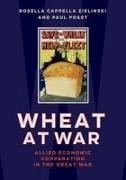Read more
Wheat at War explores how the Allies in the First World War created international institutions, such as the Wheat Executive, that were given the authority to make shipping and wheat distribution decisions on behalf of all the allies. As a case study, the Wheat Executive improves our understanding of international institutional design, the importance of commodities during wartime, economic coordination amongst wartime coalition members, and the legacies of international cooperation during the First World War.
List of contents
- Preface
- Chapter 1: Why Wheat and the First World War?
- Chapter 2: Necessity and Willingness: A Guiding Framework
- Chapter 3: Retaining Authority: The CIR and the Joint Committee
- Chapter 4: Ceding Authority: The Wheat Executive
- Chapter 5: Sharing Authority: The Allied Maritime Transport Council
- Chapter 6: Reclaiming Authority: The Supreme Economic Council
- Chapter 7: Conclusions and Implications
- Bibliography
- Index
About the author
Rosella Cappella Zielinski specializes in the study of conflict with an emphasis on how states mobilize their resources for war. She is an Associate Professor of Political Science at Boston University and non-resident fellow at the Brute Krulak Center for Innovation and Creativity at Marine Corps University. She is the author of
How States Pay for Wars (2016), winner of the 2017 American Political Science Association Robert L. Jervis and Paul W. Schroeder Best Book Award in International History and Politics. She received her PhD in Political Science from the University of Pennsylvania and held fellowships at the Clements Center for National Security at the University of Texas at Austin and the John Sloan Dickey Center for International Understanding at Dartmouth College.
Paul Poast is an Associate Professor in the Department of Political Science at the University of Chicago, where he specializes in alliance politics and the political economy of security. An award-winning author, he
holds a PhD from the University of Michigan, a MSc from the London School of Economics, and a BA from Miami University. He has taught at a variety of universities, including Rutgers University and The Ohio State University.
Summary
Wheat at War explores how the Allies in the First World War created international institutions, such as the Wheat Executive, that were given the authority to make shipping and wheat distribution decisions on behalf of all the allies. As a case study, the Wheat Executive improves our understanding of international institutional design, the importance of commodities during wartime, economic coordination amongst wartime coalition members, and the legacies of international cooperation during the First World War.

